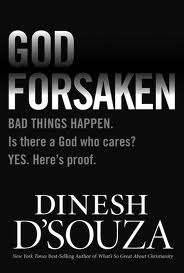Genre: Academic Theology/Apologetics
Not Recommended.
 I found Godforsaken instantly engaging. I loved the cohesiveness and organization of D’Souza’s writing and the grace of his arguments. So why did I strongly dislike this book? Because his theology and worldview lack basic biblical understanding.
I found Godforsaken instantly engaging. I loved the cohesiveness and organization of D’Souza’s writing and the grace of his arguments. So why did I strongly dislike this book? Because his theology and worldview lack basic biblical understanding.
Before D’Souza expresses his own ideas, he argues in agreement with the atheists that the Christian concept of original sin and the events of Genesis are not enough to explain why suffering exists today. The problem with his argument is that his worldview is not the Christian one–at least, not the one I see in the Bible. His academically inspired, secular theology continues in pieces throughout the book–as well as some solid theology and truly interesting points.
I personally can’t separate God’s creation of the world from the gospel–but that aside… Even if the biblical creation account was a myth, there are elements of the story that can’t be ignored, including the transfer of the dominion of the earth. The Genesis account tells that God gave dominion of the earth to Adam and Eve, but that a fallen angel disguised as a serpent tricks the humans to give up their birthright in exchange for worldly knowledge. Satan has since been the ruler of the earth, but because of Jesus’s sacrifice on the cross and resurrection from death, Christians have authority over sin and the realms of darkness. Darkness and suffering are not yet gone, but Christians can experience the fruit of the Spirit even in the worst of physical circumstances because nothing can separate us from the love of Christ. At Jesus’s second coming, suffering will be removed from the earth altogether and God will tabernacle on a cleansed earth with those who love Him. In the meantime, evil must fully blossom before it can be removed–so we can expect suffering to increase before the second coming (and also for a corresponding revival of the Holy Spirit).
D’Souza’s ideas were interesting, but I’m unsure who his target audience is. This isn’t a book for traditional Bible believing Christians. It might be of interest to an agnostic or unsure atheist, but I couldn’t recommend any new believer becoming a Christian without a solid biblical foundation, and this isn’t it. I personally can’t see this book benefiting anyone.
I received a complimentary copy of this book through the Tyndale Blog Network.
